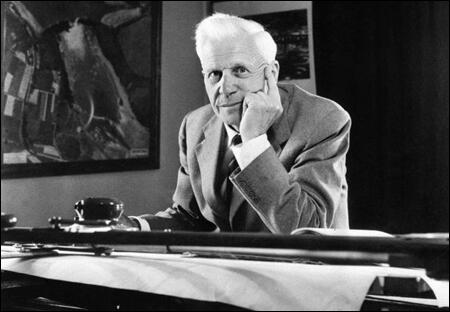On this day on 30th October
On this day in 1650 George Fox was arrested for interrupting a church service in Derby. After eight hours of close questioning he was sent to jail for a term of six months for blaspheming. Jails in the 17th century were extremely unpleasant. Jailers charged prisoners fees for better accommodations and food. Jailers were not subject to rules and treated people like Fox who did not share their religious views, very badly. Derby jail was sited over a branch of the River Derwent, exposing its prisoners to damp and filth.
During this period George Fox called his followers "Children of the Light", "People of God", "Royal Seed of God" or "Friends of the Truth". However, one of his critics, Gervase Bennett, described Fox and his followers as Quakers. This was a derisive term and was based on the fact that Fox's followers quaked and trembled during their worship. Fox defended his followers by pointing out that there were numerous biblical figures who were said to have also trembled before the Lord. Later they became known as the "Religious Society of Friends".
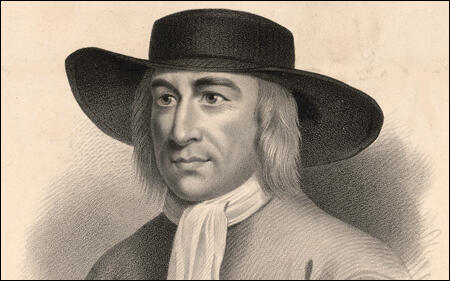
On this day in 1831 Nat Turner is arrested for leading a slave rebellion. He was the property of Benjamin Turner, a prosperous plantation owner. Nat's mother and grandmother had been brought to America from Africa and had a deep hatred of slavery. Nat grew up sharing his mother's view of slavery. Taught to read by his master's son, Nat developed deep religious beliefs and encouraged by his parents, gradually began to believe that God had chosen him to lead his people out of slavery. In 1831 Turner was sold to Joseph Travis. In February of that year an eclipse of the sun convinced Turner that this was a supernatural sign from God to start an insurrection. However, it wasn't until August 21st that Turner and about seven other slaves killed Travis and his family to launch his rebellion. In all, about 50 whites were killed. Turner had hoped this his action would cause a massive slave uprising but only 75 joined his rebellion. Over 3,000 members of the state militia were sent to deal with Turner's rebellion, and they were soon defeated. In retaliation, more than a hundred innocent slaves were killed. Turner went into hiding but was captured six weeks later. Nat Turner was executed on 11th November, 1831.
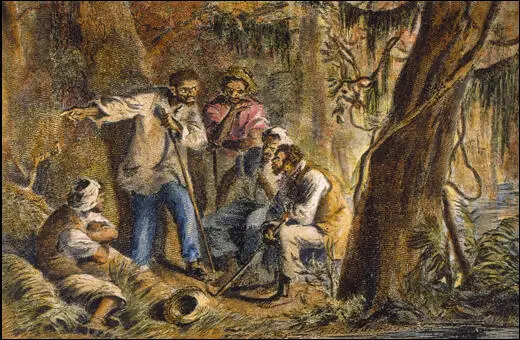
On this day in 1885 Ezra Pound, American poet was born In 1908 Pound travelled to Europe and after arriving in London he became friends with W. B. Yeats, Ford Madox Ford, Percy Wyndham Lewis, and James Joyce. His first collection of poems, With Tapers Quenched, was published in 1908. This was followed by Personae and Exultations (1909) and a book of critical essays, The Spirit of Romance (1910).
!n 1924 Pound moved to Rapallo in Italy where he worked on the Cantos. The first collection, Draft of XVI Cantos appeared in 1925. This was followed by Draft of XXX Cantos (1930), Eleven New Cantos (1937), The Fifth Decade of Cantos (1937) and Cantos LII-LXXI (1940).
A supporter of Benito Mussolini he advocated fascist ideas and during the Second World War made radio broadcasts in Rome attacking the Allies. Pound was arrested by partisans in April 1945 and taken back to the United States to be tried for treason. Judged to be insane he was confined in an asylum.
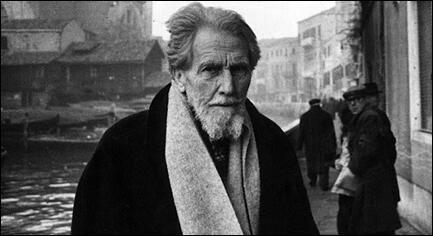
On this day in 1893 Roland Freisler, Nazi Party judge, was born. When Adolf Hitler came to power in 1933 Freisler was appointed chief personnel officer in the Prussian Ministry of Justice. The following year he became state secretary in the Prussian and then the federal Ministry of Justice.
In July 1942, Freisler joined Reinhard Heydrich, Heinrich Muller and at Adolf Eichmann the Wannsee Conference where they discussed the issue of the large number of inmates in Germany's concentration camps. At the meeting it was decided to make the extermination of the Jews a systematically organized operation. Eichmann was then placed in charge of what became known as the Final Solution. After this date extermination camps were established in the east that had the capacity to kill large numbers of inmates.
Freisler was appointed as president of the People's Court in August 1942. The court had been set up to judge "political crimes" and presided over the trial of those involved in the July Plot and the White Rose Group, Freisler was killed during an Allied air raid when he was hit on the head by falling masonary in February, 1945.
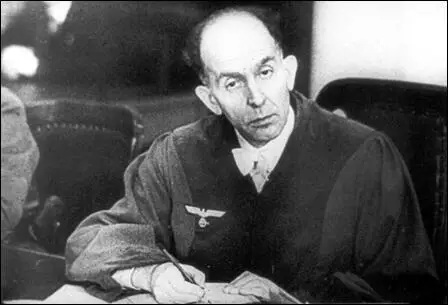
On this day in 1909 the Women's Freedom League (WFL) publish the first edition of The Vote. The WFL membership included Teresa Billington-Greig, Charlotte Despard and Nina Boyle, who were talented writers and were the main people responsible for producing the newspaper.
In 1907 some leading members of the Women's Social and Political Union (WSPU) began to question the leadership of Emmeline Pankhurst and Christabel Pankhurst. These women objected to the way that the Pankhursts were making decisions without consulting members. They also felt that a small group of wealthy women like Emmeline Pethick-Lawrence, Clare Mordan and Mary Blathwayt were having too much influence over the organisation.
In a conference in September 1907, Emmeline Pankhurst told members that she intended to run the WSPU without interference. As Emmeline Pethick-Lawrence pointed out: "She called upon those who had faith in her leadership to follow her, and to devote themselves to the sole end of winning the vote. This announcement was met with a dignified protest from Mrs. Despard. These two notable women presented a great contrast, the one aflame with a single idea that had taken complete possession of her, the other upheld by a principle that had actuated a long life spent in the service of the people. Mrs. Despard calmly affirmed her belief in democratic equality and was convinced that it must be maintained at all costs. Mrs. Pankhurst claimed that there was only one meaning to democracy, and that was equal citizenship in a State, which could only be attained by inspired leadership. She challenged all who did not accept the leadership of herself and her daughter to resign from the Union that she had founded, and to form an organisation of their own."
Emmeline and Christabel Pankhurst sent out a letter to all branches of the WSPU stating that this was not in any way a democratic group. "We are not playing experiments with representative government. We are not a school for teaching women how to use the vote. We are a militant movement... It is not a school for teaching women how to use the vote. We are militant movement... It is after all a voluntary militant movement: those who cannot follow the general must drop out of the ranks." As Simon Webb has pointed out: "This is quite unambiguous. Members must not expect to influence policy or question the leader, the role is limited to obeying orders."
As a result of this speech, Charlotte Despard, Teresa Billington-Greig, Edith How-Martyn, Dora Marsden, Helena Normanton, Anne Cobden Sanderson, Emma Sproson, Margaret Nevinson, Henria Williams, Violet Tillard and seventy other members of the WSPU left to form the Women's Freedom League (WFL). Most of its members were socialists who wanted to work closely with the Labour Party who "regarded it as hypocritical for a movement for women's democracy to deny democracy to its own members."
The Women's Freedom League grew rapidly, and soon had sixty branches throughout Britain with an overall membership of about 4,000 people. This was over twice the size of the WSPU. The WFL also established its own newspaper, The Vote. Two of the WFL leaders, Teresa Billington-Greig and Charlotte Despard, were both talented writers and were the main people responsible for producing the newspaper. It was used to inform the public of WFL campaigns such as the refusal to pay taxes and to fill in the 1911 Census forms. One of Britain's leading writers, Cicely Hamilton, became editor of the newspaper.
Most members of the Women's Freedom League, were pacifists, and so when the First World War was declared in 1914 they refused to become involved in the British Army's recruitment campaign. The WFL also disagreed with the decision of the NUWSS and WSPU to call off the women's suffrage campaign while the war was on. Leaders of the WFL such as Charlotte Despard believed that the British government did not do enough to bring an end to the war and between 1914-1918 supported the campaign of the Women's Peace Crusade for a negotiated peace. The Vote attacked Christabel Pankhurst and Millicent Garrett Fawcett, for condemning the women's peace conference.
In November 1914 two Independent Labour Party (ILP) members, Lilla Brockway and Fenner Brockway, established the No-Conscription Fellowship in its campaign against conscription. Several members of the WFL became involved in the organisation. Violet Tillard, Assistant Organising Secretary of the WFL, was appointed General Secretary of the organisation. In May 1918 she was arrested was fined £100 and costs for refusing to furnishing the name and address of the publisher of a leaflet which was circulated by the NCF. When she refused to pay the fine she was sentenced to 61 days' imprisonment.
The WFL continuted the campaign on women's rights. Helena Normanton wrote several pamphlets on the issue of women's pay. In Sex Differentiation in Salary (1914) she argued for equal pay for equal work. In another article she wrote: "During and after the war, many soldiers' wives and widows became the breadwinners for families. Should they be paid according to their sex or their work?"
The Qualification of Women Act was passed. The Manchester Guardian reported: "The Representation of the People Bill, which doubles the electorate, giving the Parliamentary vote to about six million women and placing soldiers and sailors over 19 on the register (with a proxy vote for those on service abroad), simplifies the registration system, greatly reduces the cost of elections, and provides that they shall all take place on one day, and by a redistribution of seats tends to give a vote the same value everywhere, passed both Houses yesterday and received the Royal assent."
Three members of the Women's Freedom League stood in the 1918 General Election. Charlotte Despard (Battersea), Elizabeth How-Martyn (Hendon) and Emily Phipps (Chelsea) all argued that women should have the vote on equal terms with men; that all trades and professions be opened to women on equal terms and for equal pay and that women should be allowed to serve on all juries. However, in the euphoria of Britain's victory, the women's anti-war views were very unpopular and like all the other pacifist candidates, who stood in the election, they were defeated.
After the passing of the Qualification of Women Act in 1918 the Women's Social and Political Union disbanded. However, the Women's Freedom League continued the fight for all women to have the vote. As Melanie Phillips pointed out: "Mrs Pankhurst and Christabel, it turned out, would have no part to play in the long agitation ahead for equality of franchise, pay, opportunity, divorce and inheritance."
In 1924 Lilian Lenton was employed as a travelling organizer and speaker for the Women's Freedom League (WFL). During this period she often stayed with Alice Schofield in Middlesbrough. Both women were vegetarians and worked for animal welfare charities. Lenton also wrote for the WFL newsparer, The Vote and toured the country making speeches in favour of all women getting the vote. She was also editor of the WFL's The Women's Bulletin for eleven years.
In July 1925, Lenton spoke at a meeting in Clyde. "Many of the questions the speaker (Lilian Lenton) is asked: several are irrelevant, many simply argumentative, whilst others show a real desire for information and understanding. We have the young men who fear the competition of women in the labour market, alleging that because of it they are unemployed – on what the woman is to live they neither know nor care; and others openly evince apprehension lest, when a woman can earn a decent living, her desire for the ties of matrimony may diminish, and loudly answer in the affirmative when asked if they like the idea that a woman is dependent upon them. Not few in number are the youths of about 16 who assert our "mental and physical" inferiority to the male sex."
Stanley Baldwin, wanted to change the image of the Conservative Party to make it appear a less right-wing organisation. In March 1927 He suggested to his Cabinet that the government should propose legislation for the enfranchisement of nearly five million women between the ages of twenty-one and thirty. This measure meant that women would constitute almost 53% of the British electorate. The Daily Mail complained that these impressionable young females would be easily manipulated by the Labour Party.
Winston Churchill, the Chancellor of the Exchequer, was totally opposed to the move and argued that the affairs of the country ought not be put into the hands of a female majority. In order to avoid giving the vote to all adults he proposed that the vote be taken away from all men between twenty-one and thirty. He lost the argument and in Cabinet and asked for a formal note of dissent to be entered in the minutes. There was little opposition in Parliament to the bill and it became law on 2nd July 1928. As a result, all women over the age of 21 could now vote in elections.
A bill was introduced in March 1928 to give women the vote on the same terms as men. There was little opposition in Parliament to the bill and it became law on 2nd July 1928. As a result, all women over the age of 21 could now vote in elections. Many of the women who had fought for this right were now dead including Elizabeth Garrett Anderson, Barbara Bodichon, Emily Davies, Elizabeth Wolstenholme-Elmy, Constance Lytton and Emmeline Pankhurst.
Millicent Fawcett, the leader of the NUWSS during the campaign for the vote, was still alive and had the pleasure of attending Parliament to see the vote take place. That night she wrote in her diary: "It is almost exactly 61 years ago since I heard John Stuart Mill introduce his suffrage amendment to the Reform Bill on May 20th, 1867. So I have had extraordinary good luck in having seen the struggle from the beginning."
The Vote continued with its fight for women's equality and did not end its publication until 1933.
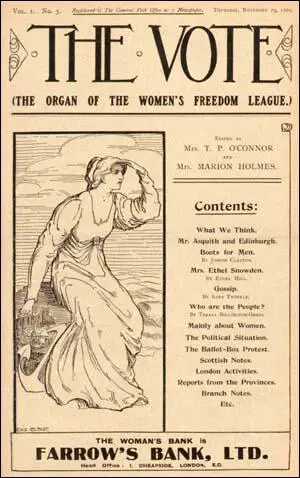
On this day in 1923 Dorothy Thompson, the historian, was born.
Dorothy Katharine Towers, the only daughter and second of five children of Reginald Joseph Towers (1892–1966) and his wife, Katharine Gane Towers (1893–1978), was born on 30 October 1923. Both her parents were professional musicians and Labour Party supporters. Her father owned a music shop in Bromley. (1)
Her grandfathers were a shoemaker and a merchant seaman. Her interest in "outsiders" developed from her experiences as a village girl of modest means at a private suburban school, and from her sense that there was more life and joy in the "villagers and gypsies on the common... than the people at school and their parents." (2)
Her earliest memory was of the General Strike in 1926. "I remember my father bringing some people home - he had a little motorcar - and these people were stranded because of the strike, we were told. My brother sent the contents of his money box to the miners. I remember an item in the newspaper, in the Daily Herald, which said that Tommy Towers had sent the contents of his money box to the miners. So I can date that clearly in 1926. I don't know how far it influenced me but certainly it's an early memory." (3)
As a teenager she joined the Young Communist League. In 1942 she was awarded an exhibition to Girton College. While at university she met and married a fellow student, Gilbert Buchanan Sale (1924–1986). During the Second World War he served in the British Army whereas she worked in a London engineering works as a draughtswoman. However, the couple divorced at the end of the war. (4)
On returning to Cambridge University in 1945 she began a lifelong relationship with Edward P. Thompson. Both were active in the Communist Party of Great Britain and both shared a strong interest in history. Dorothy later explained why she chose to study history. "We had a very good teacher at school who got us very excited by history. It was when I was about sixteen or seventeen that I realized that history was a problem-solving discipline and not just an information-absorbing one. I got interested in history because it linked up with my interest in politics, and with family memories. For instance I was always enormously puzzled that one branch of the family had actually left their native country, left a comfortable living to come and live in the East End of London, simply because their version of Christianity was different from the dominant one." (5)
Dorothy married Edward on 16 December 1948. Dorothy worked as a part-time tutor in Leeds University department of extra-mural studies. Dorothy and Edward Thompson joined Eric Hobsbawm, Christopher Hill, Rodney Hilton, A. L. Morton, Raphael Samuel, George Rudé, John Saville, Edmund Dell, Victor Kiernan and Maurice Dobb in forming the Communist Party Historians' Group. In 1952 members of the group founded the journal, Past and Present. Over the next few years the journal pioneered the study of working-class history. Saville was later to write: "The Historian's Group had a considerable long-term influence upon most of its members. It was an interesting moment in time, this coming together of such a lively assembly of young intellectuals, and their influence upon the analysis of certain periods and subjects of British history was to be far-reaching." (6)
As Christos Efstathiou has explained: "Most of the members of the Group had common aspirations as well as common past experiences. The majority of them grew up in the inter-war period and were Oxbridge undergraduates who felt that the path to socialism was the solution to militarism and fascism. It was this common cause that united them as a team of young revolutionaries, who saw themselves as the heir of old radicalism." (7)
During the 20th Party Congress in February, 1956, Nikita Khrushchev launched an attack on the rule of Joseph Stalin. He condemned the Great Purge and accused Joseph Stalin of abusing his power. He announced a change in policy and gave orders for the Soviet Union's political prisoners to be released. Pollitt found it difficult to accept these criticisms of Stalin and said of a portrait of his hero that hung in his living room: "He's staying there as long as I'm alive". Khrushchev's de-Stalinzation policy encouraged people living in Eastern Europe to believe that he was willing to give them more independence from the Soviet Union. (8)
In Hungary the prime minister Imre Nagy removed state control of the mass media and encouraged public discussion on political and economic reform. Nagy also released anti-communists from prison and talked about holding free elections and withdrawing Hungary from the Warsaw Pact. Khrushchev became increasingly concerned about these developments and on 4th November 1956 he sent the Red Army into Hungary. During the Hungarian Uprising an estimated 20,000 people were killed. Nagy was arrested and replaced by the Soviet loyalist, Janos Kadar. (9)
The Thompsons, like most members of the Communist Party Historians' Group, supported Imre Nagy and as a result, like most Marxists, they left the Communist Party of Great Britain after the Hungarian Uprising and a "New Left movement seemed to emerge, united under the banners of socialist humanism... the New Leftists aimed to renew this spirit by trying to organise a new democratic-leftist coalition, which in their minds would both counter the 'bipolar system' of the cold war and preserve the best cultural legacies of the British people." (10)
Former members of the Communist Party Historians' Group published the socialist journal The New Reasoner. Her biographer and friend, Sheila Rowbotham, pointed out: "Characteristically, her competence meant she was designated business manager, though she also read through submitted manuscripts. The break with the Communist party was painful, but it also brought hope in the creation of a new left. Dorothy worked with the writers, artists, historians and trade unionists who were forming the new left clubs in many towns." (11)
Dorothy Thompson had three children: Ben (1948), Mark (1951) and Kate (1956) and this left little time for sustained historical research. She later argued that her days revolved as much around "bringing up children, running a household and taking an active part in contemporary politics" as around teaching and research.(12)
In 1957 Thompson helped form the Campaign for Nuclear Disarmament (CND). Other members included J. B. Priestley, Bertrand Russell, Fenner Brockway, Frank Allaun, Donald Soper, Vera Brittain, Sydney Silverman, James Cameron, Jennie Lee, Victor Gollancz, Konni Zilliacus, Richard Acland, A. J. P. Taylor, Canon John Collins and Michael Foot. (13)
During the 1960s she continued adult teaching and did research for the Dictionary of Labour Biography. In 1970 she started her first full-time job as a lecturer in history at the University of Birmingham, where for twenty years she exercised a powerful impact upon her students. She returned to her study of Chartism "and in the agitation for political rights for working people and for women." (14) This led to the publication in 1984 of The Chartists: Popular Politics in the Industrial Revolution. (15)
Duane C. Anderson has argued that the book was "many years the landmark history of Chartism reflecting her enormous knowledge and breadth of research in this area. Her research into Chartism was ground breaking, opening up new topics of study from a focus on female Chartists to the role ethnicity in Chartist politics." (16)
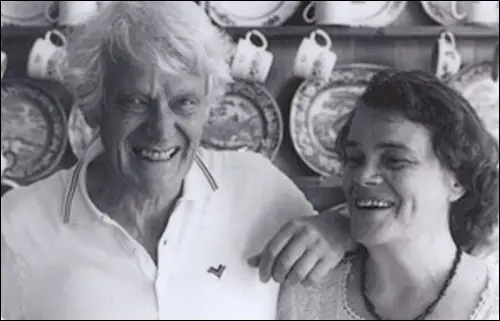
On this day in 1938 Orson Welles broadcasts a radio adaptation of H. G. Wells's The War of the Worlds. Welles's broadcast become famous for tricking some of its listeners into believing that a Martian invasion was actually taking place due to the "breaking news" style of storytelling employed in the first half of the show. The illusion of realism was furthered because the Mercury Theatre on the Air was a sustaining program without commercial interruptions; the first break in the drama came after Martian war machines were described as devastating New York City. In the days after the adaptation, widespread outrage was expressed in the media. The program's news-bulletin format was described as deceptive by some newspapers and public figures, leading to an outcry against the broadcasters and calls for regulation by the FCC.
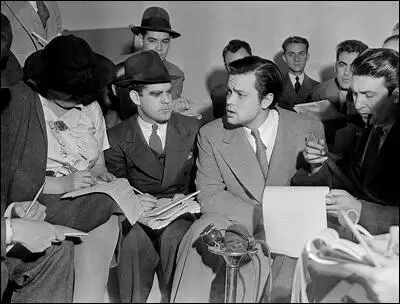
On this day in 1941 President Franklin D. Roosevelt approves $1 billion in Lend-Lease aid to the Allied nations. The legislation gave President Roosevelt the powers to sell, transfer, exchange, lend equipment to any country to help it defend itself against the Axis powers. A sum of $50 billion was appropriated by Congress for Lend-Lease. The money went to 38 different countries with Britain receiving over $31 billion.
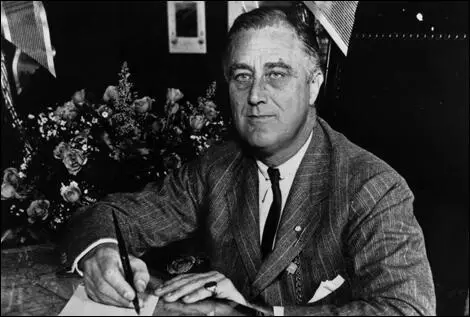
On this day in 1941, around 1500 Jews from Pidhaytsi are sent by Nazis to Belzec extermination camp. At the Wannsee Conference held in January 1942 it was decided to make the extermination of the Jews a systematically organized operation. After this date extermination camps were established in the east that had the capacity to kill large numbers including Belzec (15,000 a day), Sobibor (20,000), Treblinka (25,000) and Majdanek (25,000). It has been estimated that between 1933 and 1945 a total of 1,600,000 were sent to concentration work camps. Of these, over a million died of a variety of different causes. During this period around 18 million were sent to extermination camps. Of these, historians have estimated that between five and eleven million were killed.
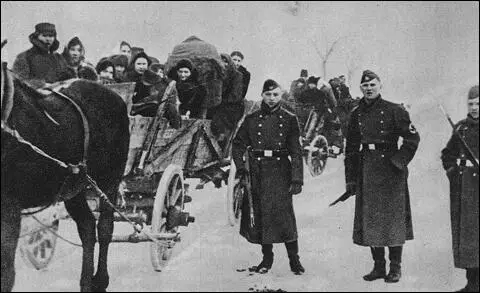
On this day in 1944 Anne Frank is deported from Auschwitz to the Bergen-Belsen concentration camp. Anne Frank and her sister both died of typhus in March, 1945.
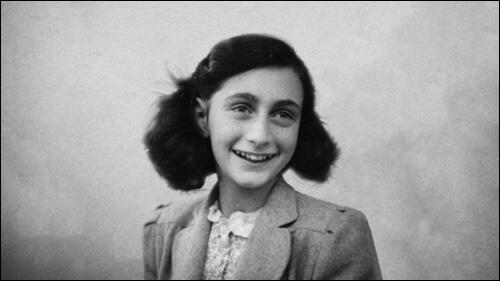
On this day in 1957 the government revealed plans to allow women to sit in the House of Lords. The Labour Party had always said it wants to abolish the Lords but never acted upon it. Martin Pugh, the author of Speak for Britain: A New History of the Labour Party (2011) points out: "In 1922 the party had almost no representation in the House of Lords and was officially committed to abolishing the hereditary peerage." Arthur Ponsonby introduced a bill to abolish hereditary titles altogether but there were already signs of compromise.
"While Tory propaganda strove to depict Labour as subversive and anti-Establishment, leading politicians were busy defusing the charge." Leading Labour politicians such as Ramsay MacDonald, John R. Clynes, George Barnes, Jimmy Thomas, Philip Snowden and Arthur Henderson attended royal weddings and Buckingham Palace garden parties. The idea of abolishing the House of Lords was quietly dropped and after the 1929 General Election MacDonald appointed a member of the upper chamber, Earl De La Warr, to his government, even though he admitted he was not a party member.
Attempts were made to reintroduce this policy. At the 1933 Labour Party Conference Stafford Cripps advocated that the next Labour government would immediately abolish the House of Lords, and pass an Emergency Act "to take over or regulate the financial machine, and put into force any measure that the situation may require for the immediate control or socialisation of industry and for safeguarding the supply of food and other necessaries." Cripps pointed out that it was completely unacceptable to continue a system that allows the rich to veto laws that they do not like. However, this important motion was never voted on.
Clement Attlee became the new leader of the Labour Party in 1935 and showed no interest in abolishing the House of Lords. Harold Laski continued to denounce it as "an indefensible anarchronism" and that its existence was not "compatible with the objective of Socialism". Attlee was unimpressed with this argument and when he became prime minister following the 1945 General Election he created no fewer than eighty-two hereditary peerages. He symbolised Labour's new stance by accepting an earldom when he retired in 1955.
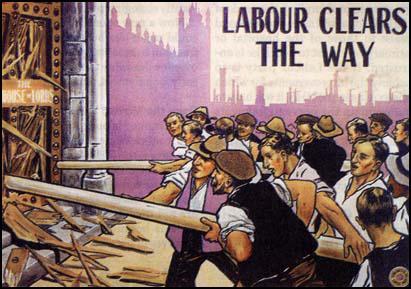
On this day in 1979 Barnes Wallis died. Wallis designed the bouncing bombs that were used by Guy Gibson and the 617 Squadron to successfully breach the Mohne and Eder dams in the Ruhr during the Dambusters Raid on 16th May 1943. The rotating bouncing bomb skipped over the water and exploded while sinking to the base of the retaining wall of the dam. It produced heavy floods and badly damaged German production in the Ruhr. When the decision was taken to concentrate on area bombing Wallis began looking at the design of bombers that could drop heavy bombs. The adapted Avro Lancaster was able to drop two bombs developed by Wallis, Tallboy (1944) and Grand Slam (1945).
